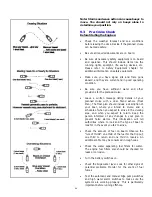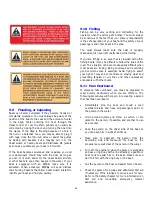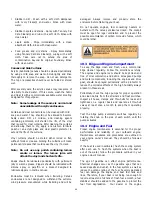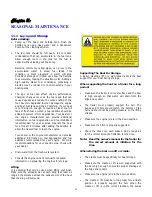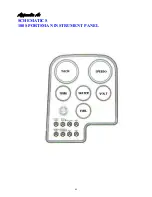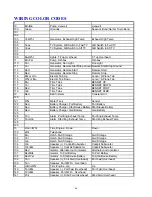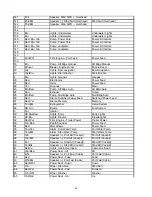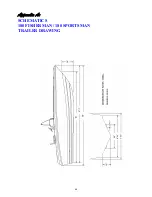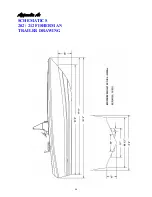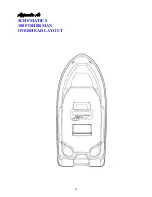
•
Stubborn dirt - Wash with a soft cloth dampened
with Ivory Flakes® and water. Rinse with clean
water.
•
Stubborn spots and stains - Spray with Tannery Car
Care Cleaner® and rub with a soft cloth. Rinse with
clean water.
• Liquid spills - Wipe immediately with a clean
absorbent cloth. Rinse with clean water.
• Food grease and oily stains - Spray immediately
using Tannery Car Care Cleaner®, wiping with a soft
cloth. Take care not to extend the area of
contamination beyond its original boundary. Rinse
with clean water.
Canvas and Side Curtains
Acrylic (Sunbrella) canvas should be cleaned periodically
by using a mild soap and water. Scrub lightly and rinse
thoroughly to remove the soap. Do not use detergents.
The top or accessories should never be folded or stored
wet.
After several years, the acrylic canvas may lose some of
its ability to shed water. If this occurs, wash the fabric
and treat it with a commercially available water proofing
designed for this purpose.
Note: Some leakage at the seams is normal and
unavoidable with acrylic enclosures.
Curtains and clear connectors can be cleaned with mild
soap and water. They should not be allowed to become
badly soiled. Dirt, oil, mildew, and cleaning agents
containing ammonia, will shorten the life of the vinyl
that is used for clear curtains. After cleaning the curtains
and allowing them to dry, apply a non-lemon furniture
polish or an acrylic glass and clear plastic protector to
extend the life of the curtains.
Vinyl curtains should be stored either rolled or flat,
without folds or creases. Folding the curtains will make
permanent creases that could cause the vinyl to crack.
Note: Do not use any polish containing lemon
scents or lemon. The lemon juice will
attack the vinyl and shorten its life.
Snaps should be lubricated periodically with petroleum
jelly or silicone grease. Zippers should be lubricated with
silicone spray or paraffin or a product designed to
lubricate zippers in marine canvas.
Enclosures must be removed when trailering. Canvas
enclosures are not designed to withstand the extreme
wind pressure encountered while trailering and will be
damaged. Always remove and properly store the
enclosure before trailering your boat.
Do not operate engines, fuel consuming heaters or
burners with the canvas enclosures closed. The cockpit
must be open for legal ventilation and to prevent the
possible accumulation of carbon monoxide fumes, which
could be lethal.
10.3 Bilge and Engine Compartment
To keep the bilge clean and fresh, use a commercial
bilge cleaner regularly. Follow the directions carefully.
The engines and engine room should be kept clean and
free of oil accumulation and debris. All exposed pumps
and metal components, including the engines and drive
gear, should be sprayed periodically with a protector to
reduce the corrosive effects of the high humidity always
present in these areas.
Periodically check the bilge pumps for proper operation
and clean debris from the strainers and float switches.
Inspect all hoses, clamps and thru-hulls for leaks and
tightness on a regular basis and operate all thru-hull
valves at least once a month to keep them operating
properly.
Test the bilge pump automatic switches regularly by
rotating the knob on the side of each switch until the
pump activates.
10.4
Engine and Fuel
Proper engine maintenance is essential for the proper
performance and reliability of your outboard engine.
Maintenance schedules and procedures are outlined in
your engine owner’s manual. They should be followed
exactly.
If the boat is used in saltwater, flush the cooling system
after each use. To flush the systems when the boat is
out of the water, follow the procedure outlined in your
engine owner’s manual.
The age of gasoline can affect engine performance.
Chemical changes occur as the gasoline ages that can
cause deposits and vanish in the fuel system as well as
reduce the octane rating of the fuel. Severely degraded
fuel can damage the engine and boat fuel tank and
lines. Therefore, if your boat is not being run enough to
require at least one full tank of fresh fuel a month, a fuel
stabilizer should be added to the gasoline to protect the
fuel from degradation. Your dealer or the engine
55
Summary of Contents for 180 Sportsman
Page 2: ...2...
Page 4: ...4...
Page 7: ...180 FISHERMAN SPECIFICATIONS 7...
Page 8: ...180 SPORTSMAN SPECIFICATIONS 8...
Page 9: ...202 FISHERMAN SPECIFICATIONS 9...
Page 10: ...212 FISHERMAN SPECIFICATIONS 10...
Page 18: ...18...
Page 39: ...SAFETY LABELS 2601 1124 39...
Page 40: ...180 FISHERMAN 180 SPORTSMAN CAPACITY LABELS 40...
Page 41: ...202 212 FISHERMAN CAPACITY LABELS 41...
Page 61: ...Appendix A SCHEMATICS 180 FISHERMAN INSTRUMENT PANEL 61...
Page 62: ...Appendix A SCHEMATICS 180 SPORTSMAN INSTRUMENT PANEL 62...
Page 63: ...Appendix A SCHEMATICS 202 212 FISHERMAN INSTRUMENT PANEL 63...
Page 68: ...Appendix A SCHEMATICS 180 FISHERMAN 180 SPORTSMAN TRAILER DRAWING 68...
Page 69: ...Appendix A SCHEMATICS 202 212 FISHERMAN TRAILER DRAWING 69...
Page 70: ...Appendix A SCHEMATICS 180 FISHERMAN OVERHEAD LAYOUT 70...
Page 71: ...Appendix A SCHEMATICS 180 SPORTSMAN OVERHEAD LAYOUT 71...
Page 72: ...Appendix A SCHEMATICS 202 FISHERMAN OVERHEAD LAYOUT 72...
Page 73: ...Appendix A SCHEMATICS 212 FISHERMAN OVERHEAD LAYOUT 73...
Page 77: ...MAINTENANCE LOG 77...
Page 78: ...MAINTENANCE LOG 78...
Page 80: ...Appendix D BOAT ACCIDENT REPORT 80...
Page 81: ...81...
Page 87: ...Appendix F TROUBLESHOOTING GUIDE 87...
Page 88: ...TROUBLESHOOTING GUIDE 88...
Page 89: ...TROUBLESHOOTING GUIDE 89...
Page 90: ...TROUBLESHOOTING GUIDE 90...
Page 91: ...TROUBLESHOOTING GUIDE 91...




